 MyCatBreeds
MyCatBreeds Devon Rex is originated from United Kingdom but Chausie is originated from Egypt. Both Devon Rex and Chausie are having almost same weight. Devon Rex may live 3 years less than Chausie. Both Devon Rex and Chausie has same litter size. Both Devon Rex and Chausie requires Low maintenance.
Devon Rex is originated from United Kingdom but Chausie is originated from Egypt. Both Devon Rex and Chausie are having almost same weight. Devon Rex may live 3 years less than Chausie. Both Devon Rex and Chausie has same litter size. Both Devon Rex and Chausie requires Low maintenance.
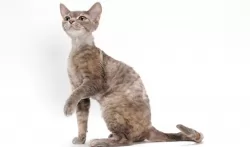 The Devon Rex is a cat known for its large ears and its curly, soft coat. It hails from England, emerging in the 1950s.
The Devon Rex is a cat known for its large ears and its curly, soft coat. It hails from England, emerging in the 1950s.
The cat is recognized by quite a few cat associations. The first of these cats was discovered by Beryl Cox in 1959 in Buckfastleigh, Devon. When the cat started appearing in cat shows in the UK, people starting becoming interested in owning these unusual cats.
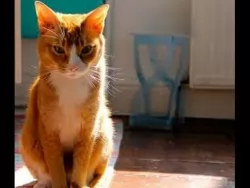 The Afro-Chausie came about from breeding a few individuals from a species of jungle cat which was native to India, Asia and the Middle East. In other words, this is a cross between a wild cat and a domesticated cat.
The Afro-Chausie came about from breeding a few individuals from a species of jungle cat which was native to India, Asia and the Middle East. In other words, this is a cross between a wild cat and a domesticated cat.
It was only in 1995 that the Chausie was recognized as a domestic breed, and by the International Cat Association.
The Chausie breed essentially began in the 1990s, when breeders name the breed Chausie and also developed a breeding program. They received registration status in 1995. Chausies are bred in North America and Europe and in 2003 became a new breed in the United States.
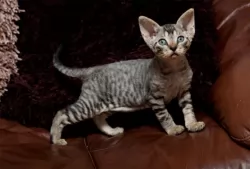 Known for its slender, light build, and weighing roughly between 2 and 4kg, the medium-sized Devon Rex has large, rounded ears. It is the large, rounded ears, set low on the sides of the broad head that make it slightly gremlin-like in appearance.
Known for its slender, light build, and weighing roughly between 2 and 4kg, the medium-sized Devon Rex has large, rounded ears. It is the large, rounded ears, set low on the sides of the broad head that make it slightly gremlin-like in appearance.
Their eyes are also large, and their noses are slightly upturned. It’s short, curly coat is another unusual feature and comes in many colors and patterns. The eyes can be blue, yellow, copper or he can be odd-eyed.
Your Devon Rex is quite a naughty cat, enjoying getting up to all kinds of mischief. Energetic, they love leaping up high onto perches so you’ll often find your Devon Rex in odd spots, more so if it's a spot in the sun as he loves warmth. It is why it is important to buy a cat tree for this cat.
It’s a loving, loyal cat and it will attach itself to one member of the family and then they are capable of pouring out the love and affection on this particular person. They’re also playful cats, as well as being intelligent.
He can learn a few tricks and can also be trained to walk on a leash. This is an active, energetic breed and will provide his human family with hours of amusing entertainment.
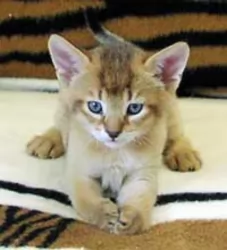 The Chausie is a medium to large cat with a long body and long legs. In fact, the hind legs are somewhat longer than their front legs, and they’re able to easily leap into the air and up onto high perches. Some people say these cats look like Pumas.
The Chausie is a medium to large cat with a long body and long legs. In fact, the hind legs are somewhat longer than their front legs, and they’re able to easily leap into the air and up onto high perches. Some people say these cats look like Pumas.
The adult Afro-Chausie can weigh between 5 to 9kg and they stand in height from 35cm to 45cm and sometimes taller, both male and female.
The ears of the cat are broad and tall and the almond-shaped eyes are a yellow to green shade. The TICA Chausie breed standard says that the cat comes in 3 colors – a black/brown ticked coats, solid black and black grizzled tabby, but in fact, they come in quite a few other colors and patterns too.
Your Afro-Chausie is an intelligent, loyal, social and athletic cat that is also playful. They love their human companions and will form a deep bond with them, making it difficult to rehome him later on.
They don’t like being alone, in fact to such an extent that they will befriend dogs in the home too. This is such an active cat and you can even train him to walk on a leash.
It’s a cat that also loves water and Similar to Bengals and Savannahs, this breed, too, enjoys water. This cat will form deep bonds with owners, hence rehoming has been known to be particularly challenging with this breed
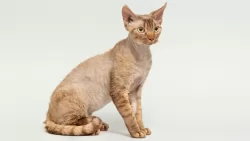 Your Devon Rex is a social cat and is happy to be found on your lap. He doesn’t take kindly to being left on his own though. He isn’t a suitable fit for someone who works all day.
Your Devon Rex is a social cat and is happy to be found on your lap. He doesn’t take kindly to being left on his own though. He isn’t a suitable fit for someone who works all day.
If you love animals, then maybe another companion animal would be a good idea as he is an amicable cat and gets on well with other animals.
When you spend time with your cat, make sure it is a special time, full of treats and stimulating play as he will learn to even fetch a small ball.
Just give him lots of attention and he’ll be your provider of companionship and entertainment.
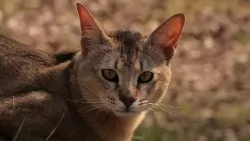 The Chausie loves human contact and they love games with their human family.
The Chausie loves human contact and they love games with their human family.
They’re intelligent and are constantly looking for things to do. They are athletic and have plenty of energy. They’re social, playful and make great playmates for children who have been taught to respect animals.
When you bring an Afro-Chausie into your home, you can expect to have a lot of action and entertainment with this beautiful cat.
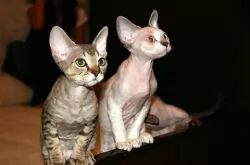 This particular cat isn’t known for any extreme health issues but even so, there are some health problems that are important to know about -
This particular cat isn’t known for any extreme health issues but even so, there are some health problems that are important to know about -
This is where the patella or knee cap moves out of its usual spot. It can occur because of a number of reasons such as an injury or congenital malformation. The vet will want x-rays because sometimes hip dysplasia is also present.
This is an inherited condition seen in both male and female cats and usually in young kittens. The cat has an odd gait with a head that bobs along as is tries to walk. The cat has tremors and also has difficulty with swallowing. With a visit to the vet and special care, your cat can do well.
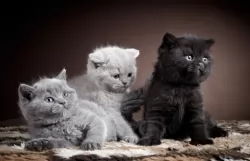 With good health, your Afro Chausie can live to be anything between 12 – 16 years of age. These cats are prone to developing food allergies, and this is why it is important to feed your Chausie high-quality food.
With good health, your Afro Chausie can live to be anything between 12 – 16 years of age. These cats are prone to developing food allergies, and this is why it is important to feed your Chausie high-quality food.
They’ve got fragile digestive systems and many are gluten intolerant.
All kinds of parasites can invade your Afro-Chausie’s body – internally and externally so be sure to have your Chausie checked over for parasites such as tick and fleas, worms and mites.
Check your Chausie for putting on too much weight as these cats have a huge appetite.
You just have to bear in mind that these cats can develop any of the illnesses that other domesticated cats get
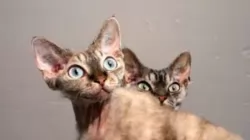 The Devon rex cat breed is known for its unusual looks with its wavy fur, large ears and large eyes. It is considered a rare breed and you want to make sure that you take proper care of him.
The Devon rex cat breed is known for its unusual looks with its wavy fur, large ears and large eyes. It is considered a rare breed and you want to make sure that you take proper care of him.
Owners of the Devon Rex know that these cats love their food and it has to be top quality food to enhance good feline health.
Cats are carnivores, ad this actually means that they should stick to a meat diet. Any food you buy your cat should be mainly meat. Look at the packaging of the commercially manufactured cat foods you want to buy, and make sure that the first few ingredients are some sort of meat.
Remember that any uncertainty with feeding your cat, you can chat with your vet.
Keep the inside of your cat’s ear free of an accumulation of wax and dirt as well as infection. If you don’t like the idea of probing in your cat’s ears, be in contact with your vet or a reputable, professional cat groomer.
Trim the cat’s nails.
Check inside his mouth for bad teeth as this could be causing him pain.
Clean your cat’s litter box every single day and also replace the grit regularly.
Get your cat veterinary care as soon as he shows signs of illness. Certainly, make sure all his vaccines and deworming are up to date.
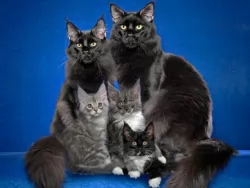 With their short coats, they only need to be brushed once a week as they are moderate shedders.
With their short coats, they only need to be brushed once a week as they are moderate shedders.
Provide your cat with a quiet place to sleep and which is comfortable and dry.
A cat tree can be useful for allowing your cat to climb and scratch.
Chausies are essentially meat-eaters. They don’t want to eat fruit and nuts. One of the Chausie’s ancestors was a wild cat and this is why they don’t eat the same foods as what your dog does.
Every cat thrives on a high-protein, low-carbohydrate diet. A dog’s diet with scraps from the table as well as human food can be fatal for your Chausie if it becomes your cat’s regular food.
He requires a diet of quality meat – beef, chicken, fish and organs – all foods that are easily digestible for your cat. Cats also need taurine from muscle meat such as shellfish and fish.
Always make sure your Chausie has access to a constant supply of fresh, cool water.